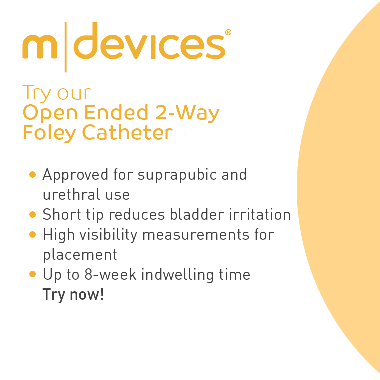Australian news
As we head into the final quarter of this year, I am proud to report on all we have achieved to date at the Continence Foundation. We run numerous campaigns designed to not only promote awareness and encourage conversations about incontinence but also to remind people where to seek help. The National Continence Helpline (1800 33 00 66) provides a first point of call and is staffed by nurse continence specialists who provide free and confidential advice. Our website (www.continence.org.au) is also an integral source providing extensive resources including fact sheets, videos and bladder and bowel health information for consumers and health professionals.
Joint 31st National Conference on Incontinence and the 4th Functional Urology Symposium
The joint 31st National Conference on Incontinence (NCOI) and the 4th Functional Urology Symposium (FUS) was held at the Adelaide Convention Centre from 14–17 June. Presented by the Continence Foundation of Australia and the Urological Society of Australia and New Zealand, this special joint conference program brought together international and local experts and thought leaders from different disciplines to cover all aspects of the research, assessment and treatment of continence and functional urology related issues, as well as the most current evidence-based best practice.
The conference was a great success, with over 515 delegates attending and so many highlights to share. The 2024 conference will be held in Brisbane from 15–18 May. Details are available on our website.
The Foundation also offered scholarships for rural and remote registered nurses and physiotherapists to attend. Five registered nurses and five physiotherapists were successful, receiving full conference attendance, including networking events, accommodation and flights.
The Great Dunny Hunt
The 2023 Great Dunny Hunt campaign ran from 3 April to 19 June, asking Australians for submissions to find Australia’s best public toilets. The public were asked to upload photographs of their favourite public toilet to the National Public Toilet Map (NPTM) website or app, as well as add any updates to any of the facilities, to go into the draw to win one of three $500 Eftpos gift vouchers. This year’s hunt attracted over 778 entries, with 1,935 photos and 150 new facilities added, which is an excellent result.
The NPTM is extremely beneficial for the one in four Australians who experience incontinence as well as the 38% of people living with a disability who are experiencing incontinence. The updated map will benefit the thousands of Australians who experience incontinence by identifying nearby toilet facilities that suit their individual needs.
The NPTM currently shows the location of more than 22,000 toilet facilities across Australia. The campaign continues to attract great interest and plays a critical role in raising awareness of the NPTM and incontinence within the community. Please visit www.continence.org.au/great-dunny-hunt and www.toiletmap.gov.au for more information.
World Continence Week (WCW)
World Continence Week (WCW) is an annual international event which aims to raise awareness of continence-related issues. This year, WCW ran from 19–25 June 2023, focussing on the lived experience of incontinence and the impact it can have on people’s lives.
One of the highlights of WCW for the Foundation was to have Australian Football League (AFL) icon Robert (Dipper) DiPierdomenico supporting the Foundation by sharing his own lived experience with urinary retention in a video promoting awareness, support and the BINS4Blokes campaign. WCW also heralded the installation of incontinence product disposal bins in 20 of the male public toilets at the Melbourne Cricket Ground (MCG).
The Foundation also hosted a Lived Experience Panel webinar to encourage people to talk about incontinence, raise awareness and understanding, and let people know where to find help and support. A group of panellists discussed their lived experience of incontinence, barriers to seeking help, common misconceptions about incontinence and how to change the narratives around this common condition. Audience members were provided the opportunity to ask questions and provide feedback.
We also launched the first episode of our new podcast series, This is My Story, discussing the lived experience with incontinence. Each episode represents the diverse experiences of five individuals, how their incontinence was identified, how they manage it, the care path they have taken, the value of professional health care, and their tips and strategies for living with incontinence.
National Consumer Continence Survey
The Foundation’s annual National Consumer Continence Survey provides valuable feedback that helps the Foundation understand the experience of people who live with incontinence. This includes the extent of public understanding of incontinence and attitudes towards continence health, including preferences for information, treatment and support, as well as health-seeking behaviours and outcomes of interventions. This information can be used to improve products, services and marketing and communication strategies, as well as the Foundation’s advocacy activities and government reform.
A recent review of the survey resulted in the decision to spend greater focus on the consumer experience of living with incontinence and the impacts on carers of people with incontinence. The 2023 survey was undertaken in June, with over 2,000 people participating.
Education
One of our new courses is the Catheterisation Skills Course, a hybrid course designed for registered nurses. The Foundation has been recruiting and training registered nurses around Australia to act as facilitators during the skills workshop. This consists of practice and assessment of indwelling catheters in both male and female mannequins as well as suprapubic catheterisation. Following successful assessment, learners are recommended to undertake supervised catheterisation until their workplace is satisfied with their competency to independently undertake catheterisation.
Specialised Continence Modules for Nurses are 20 stand-alone modules that explore a variety of topics in depth to assist registered and enrolled nurses with their continence care practice. Learners can create their own learning bundle to meet their individualised professional development requirements. Topics include catheterisation, prolapse, the prostate and incontinence, dementia and incontinence and the ageing bladder and bowel. To access the Foundation’s online learning system, go to continencelearning.com/login/index.php
Update on the My Continence Care model
In 2019, the Continence Foundation of Australia commissioned the National Ageing Research Institute (NARI) and the lead researcher, Professor Joan Ostaszkiewicz, to develop and test a best practice model of continence care for residential aged care. The purpose of the model is to ensure older people receive evidence-based, person-centred, clinically-informed continence care that is responsive to their individual needs, is safe, is protective of their dignity and optimises their functional abilities. This formed the solid basis of what is now the My Continence Care model.
The My Continence Care model has been developed to enhance governance oversight of continence care, empower individuals receiving continence care, and address gaps in education programs for people providing continence care. The Foundation has been working closely with external stakeholders, including residential aged care providers, to co-design the model. Gaining insight from reference and working group members, consisting of people with lived experience, health professionals and members of the aged care workforce, has afforded the opportunity to make My Continence Care a fit for purpose model for the residential aged care environment.
My Continence Care is a multi-pronged resource program that includes targeted education modules for the multi-faceted aged care workforce, prompts for toolbox talks and corridor conversations in line with the module delivery to promote mentorship amongst My Continence Care champions and peers, and resources to improve reflective practice regarding quality continence care.
Initial piloting at three provider sites commenced in November 2022 and, in keeping with the co-design methodology, was paused following feedback from pilot participants identifying areas that required review and subsequent action. The learnings from this feedback led to work including review and reflection regarding project delivery method, suggestions/additions to the learning modules and an undertaking of further action on the integration of the learning management system to maximise usability.
Re-piloting is scheduled to commence in September 2023. We look forward to sharing the outcomes achieved from the project in the coming months, along with the results from the pilot to support the broader deployment of the program.
Author(s)
Rowan Cockerell
CEO, Continence Foundation of Australia


